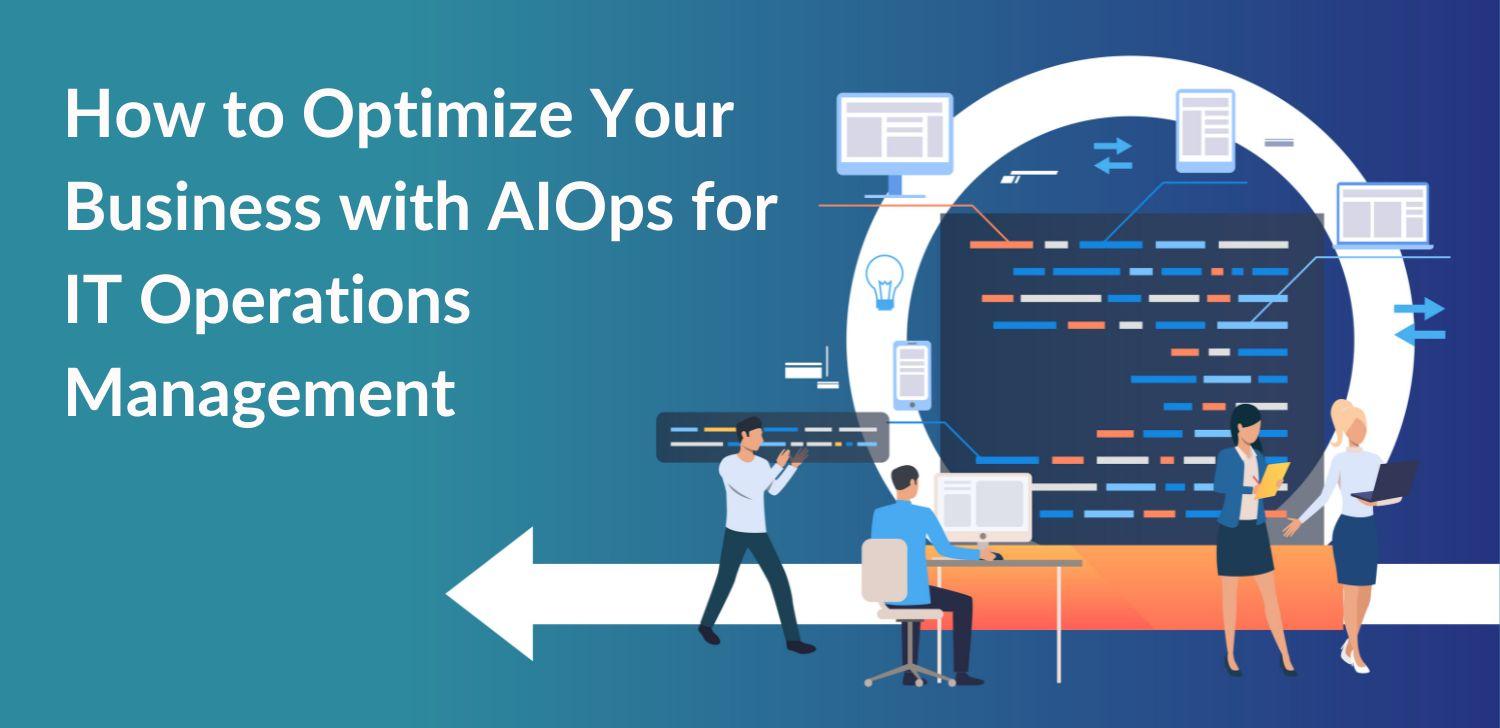How to Optimize Your Business with AIOps for IT Operations Management
Explore the ultimate guide on how to optimize your business with AIOps for IT Operations Management. Leverage the power of artificial intelligence to streamline and improve operations, improve efficiencies, and drive growth. Boost your business performance with cutting-edge technology and expert strategies. Take a look at our blog now!
In today’s rapidly evolving digital environment, businesses face numerous challenges in effectively managing their IT operations. The growing complexity of IT infrastructure, the need for continuous monitoring, and the demand for faster and more reliable services are just some of the challenges organizations face.
But with the advent of artificial intelligence for IT operations (AIOps), businesses can harness the power of AI and machine learning to optimize IT operations and drive digital transformation. This article guides you through the process of harnessing the potential of AIOps to improve your business operations and achieve better results.
Understanding AIOps for IT Operations Management
AIOps utilizes advanced algorithms, machine learning and data analytics to monitor, analyze and manage IT systems in real time. The AIOps platform collects data from a variety of sources including logs, events, and performance metrics to provide a holistic view of the IT infrastructure, enabling organizations to proactively identify issues and optimize performance.
Benefits of IT Operations Management in Business Optimization
Increased Efficiency and Productivity
AIOps enables IT teams to streamline workflows, automate routine tasks, and allocate resources more effectively. By reducing manual intervention, employees can focus on more strategic initiatives, increasing overall efficiency and productivity.
Improved Incident Management
AIOps enables enterprises to move from reactive incident management to proactive incident prevention. The platform’s predictive capabilities can identify potential issues before they escalate, minimizing downtime and service interruptions.
Predictive Analytics for Proactive Solutions
AIOps leverages predictive analytics to anticipate future trends and needs. By understanding patterns in data and user behavior, businesses can make data-driven decisions and derive more effective solutions.
AIOps Implementation: Digital Transformation Services
To unlock the full potential of AIOps, organizations must embrace: digital transformation service. Digital transformation includes reimagining business processes, integrating digital technologies, and fostering a culture of innovation for sustainable growth.
Leveraging AI Development Companies for AIOps Integration
Working with an AI development company can provide businesses with custom AI solutions that seamlessly integrate with existing IT operations management. These companies employ domain experts and data scientists who specialize in developing AI models for specific business needs.
Custom AI Solutions
AI development companies work closely with businesses to understand their unique needs and challenges. They ensure maximum value from AIOps implementations by designing and deploying AI models that align with organizational goals.
Real-time data analysis
AI development companies utilize advanced data analytics techniques to process and analyze vast amounts of data in real time. This capability allows businesses to instantly gain actionable insights so they can make data-driven decisions and take proactive actions.
Continuous Improvement
affiliated with AI development company Ensure continuous support and improvement of AI models. As technology evolves and business needs change, these companies provide regular updates, upgrades, and enhancements to optimize their AI systems and align them with business goals.
AIOps and DevOps consulting services
Collaboration between AIOps and DevOps teams is essential to a successful AIOps implementation. DevOps consulting services play a key role in seamlessly integrating AIOps into your development and operations processes.
seamless collaboration
DevOps Consulting Services Facilitates collaboration between development and operations teams to seamlessly integrate AIOps into existing IT ecosystems. Establish clear communication channels, define roles and responsibilities, and facilitate knowledge sharing among team members.
Simplified development process
By integrating AIOps into DevOps workflows, companies can automate repetitive tasks, streamline processes, and accelerate software development. This integration shortens time-to-market and reduces the potential for errors or bottlenecks in the development lifecycle.
faster time to market
The combination of AIOps and DevOps enables companies to deliver high-quality software solutions faster. Leverage automation and AI-powered analytics to group Problems can be identified and resolved quickly, shortening development cycles and improving customer satisfaction.
AIOps Implementation Challenges
AIOps offers numerous benefits, but enterprises may face certain challenges during the implementation process. Recognizing these issues is essential to devise effective strategies for successful integration.
Data Security and Privacy Issues
AIOps must deal with large amounts of sensitive data, so organizations must prioritize data security and privacy. Implementing strong security measures, encryption technologies, and compliance with data protection regulations is critical to protecting sensitive business information.
Skills Gap and Education
IT operations management requires skilled professionals with a deep understanding of AI, data analytics, and IT operations. Organizations can struggle to find and retain qualified talent. Investing in training and skills-enhancement initiatives can help close these skills gaps and ensure a skilled workforce.
Legacy system integration
Many organizations have legacy systems that may not be compatible with AIOps platforms. Integrating these systems with AIOps tools can be complex and time consuming. Gradual transition, modular integration, and API utilization are effective strategies to overcome these challenges.
How to Overcome AIOps Implementation Challenges
To overcome the challenges associated with implementing AIOps, organizations can adopt the following strategies:
Strong data security measures
Implementing strong security measures such as encryption, access control, and regular vulnerability assessments can help protect sensitive data from unauthorized access. Working with cybersecurity experts can provide valuable insights and guidance in implementing effective security protocols.
Education and Skills Improvement Initiatives
Investing in training programs and skills enhancement initiatives for existing IT staff can help organizations build a skilled workforce capable of managing AIOps platforms. This investment strengthens organizations’ ability to effectively utilize AI technologies.
Gradual transition and integration
Organizations can adopt a phased approach to implementing AIOps, starting with small pilot projects and gradually scaling up to larger deployments. This allows for better risk management, early problem identification and fine-tuning of processes for optimal results.
Successful Case Study: Optimized Businesses with AIOps
medical industry
In the healthcare industry, AIOps has enabled organizations to enhance patient care by leveraging real-time data analytics to predict equipment failures, optimize schedules, and improve operational efficiencies.
e-commerce sector
Ecommerce companies have leveraged AIOps to optimize inventory management, personalize customer experiences, and automate supply chain processes to increase customer satisfaction and increase sales.
financial services
Financial institutions have successfully implemented AIOps to detect fraud, optimize risk assessments, and automate compliance processes to increase security, reduce costs, and improve compliance.
The Future of AIOps in Business Optimization
AIOps is poised to play a major role in shaping the future of business optimization. Advances in machine learning, natural language processing, and automation will further enhance the capabilities of AIOps. This technology will become more accessible and cheaper, leading to wider adoption in a variety of industries.
conclusion
Optimizing business operations in today’s digital age is critical to staying competitive. AIOps offers an innovative approach to IT operations management, enabling enterprises to increase efficiency, improve incident management and leverage predictive analytics. Organizations can unlock the full potential of AIOps and achieve sustainable growth in a dynamic business environment by embracing digital transformation services, partnering with AI development firms, and leveraging DevOps consulting services.






